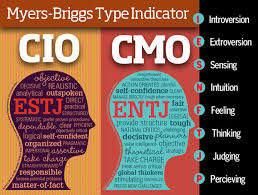 “The Myers-Briggs Type Indicator® (MBTI®) is the best known and most trusted personality assessment in the world. It’s helped develop effective work teams, build stronger families, and create successful careers. The MBTI assessment improves quality of life for you and your organization. Giving you this personalized way to take the assessment fulfills our mission: bringing lives “closer to our heart’s desire.”
“The Myers-Briggs Type Indicator® (MBTI®) is the best known and most trusted personality assessment in the world. It’s helped develop effective work teams, build stronger families, and create successful careers. The MBTI assessment improves quality of life for you and your organization. Giving you this personalized way to take the assessment fulfills our mission: bringing lives “closer to our heart’s desire.”
 This descriptor is from the home page of the Myers-Briggs Foundation—an organization that furthers the 1940’s work of psychologists Katharine Briggs and her daughter, Isabel Briggs-Myers who futhered Carl Jung’s theory. They categorized people into four principal psychological functions by which humans experience the world—sensation, intuition, feeling, and thinking—and that one of these four functions is dominant for a person most of the time.
This descriptor is from the home page of the Myers-Briggs Foundation—an organization that furthers the 1940’s work of psychologists Katharine Briggs and her daughter, Isabel Briggs-Myers who futhered Carl Jung’s theory. They categorized people into four principal psychological functions by which humans experience the world—sensation, intuition, feeling, and thinking—and that one of these four functions is dominant for a person most of the time.
Sounds familiar… I took this personality test a few years ago and jotted the score in my notebook. Hmmm… might make a good blog topic so I’ll take it again and compare to the old score… lemme take another look at what this thing’s all about.
Myers & Briggs developed an “introspective, self-report questionnaire designed to indicate psychological preferences and typing how people perceive the world and make decisions”.
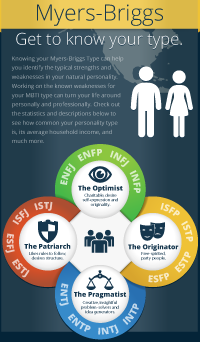 Paraphrasing from Wikepedia (this is not-so-exciting stuff – promise it’ll get livlier) — “Carl Jung’s typology theories postulated a sequence of 4 cognitive functions (thinking, feeling, sensation, and intuition), each having 1 of 2 polar orientations (extraversion or introversion), giving a total of 8 dominant functions. The purpose of the Myers-Briggs Type Indicator personality inventory is to make the theory of psychological types described by Jung understandable and useful in people’s lives.” (I hope so, because this is a pretty wordy explanation.)
Paraphrasing from Wikepedia (this is not-so-exciting stuff – promise it’ll get livlier) — “Carl Jung’s typology theories postulated a sequence of 4 cognitive functions (thinking, feeling, sensation, and intuition), each having 1 of 2 polar orientations (extraversion or introversion), giving a total of 8 dominant functions. The purpose of the Myers-Briggs Type Indicator personality inventory is to make the theory of psychological types described by Jung understandable and useful in people’s lives.” (I hope so, because this is a pretty wordy explanation.)
The theory’s essence is that seemingly random variation in behaviors is actually quite orderly and consistent, due to basic differences in the ways individuals use their perception and judgment.
Wiki goes on “Perception involves ways of becoming aware of things, people, happenings, or ideas. Judgment involves ways of coming to conclusions about what’s been perceived. If people differ systematically in what they perceive, and in how they reach conclusions, then it is only reasonable for them to differ correspondingly in their interests, reactions, values, motivations, and skills.”
Okay. Starting to make sense to me. Tell me more about these 8 functions.
 “In developing the Myers-Briggs Type Indicator, the aim was to make the insights of type theory accessible to individuals and groups. They addressed 2 related goals in the developments and application of the MBTI instrument:
“In developing the Myers-Briggs Type Indicator, the aim was to make the insights of type theory accessible to individuals and groups. They addressed 2 related goals in the developments and application of the MBTI instrument:
-
The identification of basic preferences of each of the four dichotomies specified or implicit in Jung’s theory.
-
The identification and description of the 16 distinctive personality types that result from the interactions among the preferences.”
Whoa. 16? Thought there was 8? Not following the math.
“Stick with us,” they said. “We evolved — 4X4=16.”
Huh?
“We took Jung’s base and turned it into four questions:
-
What’s your favorite world? — Do you prefer to focus on the outer world, or on your own inner world? This is called Extraversion (E) or Introversion (I).
-
How do you absorb information? — Do you prefer to focus on the basic information you take in, or do you prefer to interpret and add meaning? This is called Sensing (S) or Intuition (N).
-
How do you make decisions? — When making decisions, do you prefer to first look at logic and consistency, or first look at the people and special circumstances? This is called Thinking (T) or Feeling (F).
-
How do you structure? — In dealing with the outside world, do you prefer to get things decided, or do you prefer to stay open to new information and options? This is called Judging (J) or Perceiving (P).
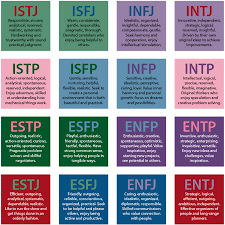 When you decide on your preference in each category, you have your own personality type, which is expressed as a four letter code. The 16 personality types of the Myers-Briggs Type Indicator instrument are listed here as they are often shown in what is called a “type table”. Casually, they’re grouped into four personalities:
When you decide on your preference in each category, you have your own personality type, which is expressed as a four letter code. The 16 personality types of the Myers-Briggs Type Indicator instrument are listed here as they are often shown in what is called a “type table”. Casually, they’re grouped into four personalities:
Analysts
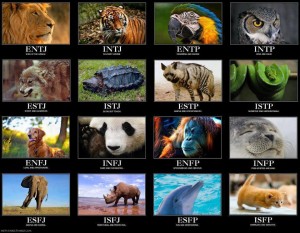 INTJ — Architect — Imaginative & strategic thinkers with a plan for everything.
INTJ — Architect — Imaginative & strategic thinkers with a plan for everything.
INTP — Logician — Innovative inventors with an unquenchable thirst for knowledge.
ENTJ — Commander — Bold, imaginative, and strong-willed leaders who will find or make a way.
ENTP — Debater — Smart and curious thinkers who cannot resist an intellectual challenge.
Diplomats
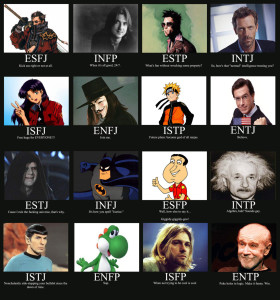 INFJ — Advocates — Quiet and mystical, yet very inspiring and tireless idealists.
INFJ — Advocates — Quiet and mystical, yet very inspiring and tireless idealists.
INFP — Mediator — Poetic, kind, and altruistic, always eager to help a good cause.
ENFJ — Protagonist — Charismatic and inspiring leaders who are able to mesmerize followers.
ENFP — Campaigner — Eager, creative, and socially free-spirits who always find a way to smile.
Sentinals
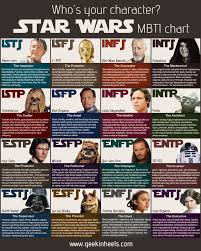 ISTJ — Logicistian — Practical and fact minded individuals who’s integrity cannot be doubted.
ISTJ — Logicistian — Practical and fact minded individuals who’s integrity cannot be doubted.
ISFJ — Defender — Very dedicated and warm protectors, always ready to protect loved ones.
ESTJ — Executive — Excellent administrators, unsurpassed at managing things and people.
ESFJ — Consul — Extraordinarily caring, social and popular people, always ready to help.
Explorers
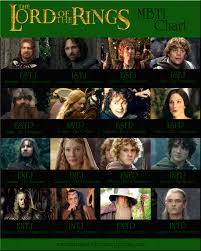 ISTP — Virtuoso — Bold and masterful experimenters, handy with all kinds of tools.
ISTP — Virtuoso — Bold and masterful experimenters, handy with all kinds of tools.
ISFP — Adventurer — Flexible and charming artists, always wanting to explore or experience something new.
ESTP — Entrepreneur — Smart, energetic, and highly perceptive people who truly enjoy living on the edge.
ESFP — Entertainer — Spontaneous, enthusiastic, and energetic people; life is never boring around them.
Interesting, I thought. I’ll take the test again and show DyingWords followers what makes me tick. So I googled around and found three different FREE approaches to the M-B test and took them all:
- Humanetrics — http://www.humanmetrics.com/cgi-win/jtypes2.asp
- My Personality Test — http://www.my-personality-test.com/personality-type/?gclid=CM2N_4CetsgCFQhsfgodXiEGjw
- Truity Type Finder — http://www.truity.com/test/type-finder-research-edition
I also checked the Myers-Briggs site at http://www.myersbriggs.org/ but they want $150 to sign-in, although it comes with an hour of shrink time.
So how’d I make out?
INTJ — Every frikkin’ time, including the one I did a few years ago.
So how accurate is it? You be the judge. Here’s my INTJ psychological diagnosis from the Myers-Briggs Type Indicator:
 The INTJ personality type is the Introverted Intuition with Extraverted Thinking type. Individuals that exhibit the INTJ personality type are knowledgeable, inventive, and theoretical, whether they’re working on long-term personal goals or creative projects in their professions. They are “big-picture” thinkers, creating constructive ambitions and planning for them accordingly. Myers-Briggs test INTJ types hold a clear idea of what they would like to accomplish in their future, and they use that vision as motivation to complete all of the necessary steps to obtain their dreams. This dedication to their visions and their ability to find ways to achieve them make INTJ types high-functioning employees:
The INTJ personality type is the Introverted Intuition with Extraverted Thinking type. Individuals that exhibit the INTJ personality type are knowledgeable, inventive, and theoretical, whether they’re working on long-term personal goals or creative projects in their professions. They are “big-picture” thinkers, creating constructive ambitions and planning for them accordingly. Myers-Briggs test INTJ types hold a clear idea of what they would like to accomplish in their future, and they use that vision as motivation to complete all of the necessary steps to obtain their dreams. This dedication to their visions and their ability to find ways to achieve them make INTJ types high-functioning employees:
-
Their looking-towards-the-future mentality helps them to create original and inspiring ideas for companies, as well as a well-thought-out plans for achieving these goals.
-
Value the intellectual ability of themselves and those of others, and place a high importance on it.
-
Can be adamant and commanding when the professional environment requires a certain level of authority.
-
Because of their ability to think long-term, they are often placed in (or place themselves in) authoritative positions in business and groups.
-
Quick to find solutions to challenges, whether that requires basing their solutions on pre-conceived knowledge or finding new information to base their decisions off of.
-
Can relate newly gathered information to the bigger picture.
-
Enjoy complicated problems, utilizing both book and street smarts (logical and hypothetical ideas) to find solutions.
They’re Strong Planners With Great Follow-Through
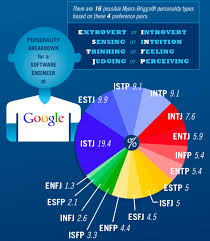 INTJ personality types are long-term goal-setters, creating plans to bring their goals to completion, and then following this plan using thought-out approaches and procedures devised by the INTJ. They are self-reliant, individualistic, and self-secure. INTJ personality types have a large amount of faith in their own competence and intelligence, even if others openly disagree or the opposite proves true. This also makes Myers-Briggs Type Indicator-assessed INTJ types their own worst critics, as they hold themselves to the highest standards. They dislike turbulence, perplexity, clutter, and when others waste their time and/or energy on something unimportant. This MBTI type is also succinct, analytical, discerning, and definitive.
INTJ personality types are long-term goal-setters, creating plans to bring their goals to completion, and then following this plan using thought-out approaches and procedures devised by the INTJ. They are self-reliant, individualistic, and self-secure. INTJ personality types have a large amount of faith in their own competence and intelligence, even if others openly disagree or the opposite proves true. This also makes Myers-Briggs Type Indicator-assessed INTJ types their own worst critics, as they hold themselves to the highest standards. They dislike turbulence, perplexity, clutter, and when others waste their time and/or energy on something unimportant. This MBTI type is also succinct, analytical, discerning, and definitive.
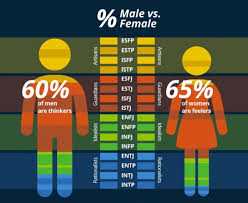 In their personal lives, Myers-Briggs test INTJ types exhibit many of the same behaviors that they do in their professional lives. They expect competence from their peers and are more than willing to share their intelligence or ideas with those around them. Occasionally, INTJ personality types may find it difficult to hold their own in social situations, whether that is due to their actions or their opinions. To others, MBTI Assessment Test -assessed INTJ types seem set in their ways or opinions because of their high respect for themselves, but oftentimes reality is just the opposite, with the INTJ type taking in new tidbits of information at all times, evaluating their own opinions and ideas accordingly. They are also often seen as a tad distant, closed off from others emotionally but not intellectually.
In their personal lives, Myers-Briggs test INTJ types exhibit many of the same behaviors that they do in their professional lives. They expect competence from their peers and are more than willing to share their intelligence or ideas with those around them. Occasionally, INTJ personality types may find it difficult to hold their own in social situations, whether that is due to their actions or their opinions. To others, MBTI Assessment Test -assessed INTJ types seem set in their ways or opinions because of their high respect for themselves, but oftentimes reality is just the opposite, with the INTJ type taking in new tidbits of information at all times, evaluating their own opinions and ideas accordingly. They are also often seen as a tad distant, closed off from others emotionally but not intellectually.
Sometimes INTJ Types Are Too Confident
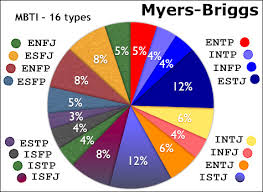 This distance associated with this MBTI test-assessed personality type can occasionally progress to the point of negativity. INTJ types can close themselves off so much that they stop revealing what they are thinking/how they are coming to certain conclusions, which can make it seem as though they are simply rushing through a task. They can often do just that—jumping to underdeveloped endings without considering all new or present information. This flaw can also cause Myers-Briggs test assessed INTJ types to overlook important data and facts necessary to achieve their goals.
This distance associated with this MBTI test-assessed personality type can occasionally progress to the point of negativity. INTJ types can close themselves off so much that they stop revealing what they are thinking/how they are coming to certain conclusions, which can make it seem as though they are simply rushing through a task. They can often do just that—jumping to underdeveloped endings without considering all new or present information. This flaw can also cause Myers-Briggs test assessed INTJ types to overlook important data and facts necessary to achieve their goals.
Their high level of competence coupled with their big-picture way of thinking can sometimes cause problems for this Myers-Briggs type. Because so many of their ideas are long-term, INTJ type ideas can occasionally lack the ability to fully come to fruition.
 In their relationships with others, MBTI Test-assessed INTJ Personality Types may come off as judgmental, especially to those who aren’t as openly enthusiastic about the INTJ types ideas or intelligence. If they feel that others are not viewing them as highly as they view themselves, there is also a chance that they will not necessarily provide the level of feedback that that individual may need. However, by concentrating on developing their Sensing and Feeling, the INTJ type may fashion more intimate connections with their peers, spending less time in their heads and more time engaging with the world around them.
In their relationships with others, MBTI Test-assessed INTJ Personality Types may come off as judgmental, especially to those who aren’t as openly enthusiastic about the INTJ types ideas or intelligence. If they feel that others are not viewing them as highly as they view themselves, there is also a chance that they will not necessarily provide the level of feedback that that individual may need. However, by concentrating on developing their Sensing and Feeling, the INTJ type may fashion more intimate connections with their peers, spending less time in their heads and more time engaging with the world around them.
The Myers-Briggs Type Indicator INTJ personality type uses their big-picture thinking along with their logical problem-solving skills to succeed in a variety of occupations, usually those requiring scientific reasoning/understanding and those that involve building or creating something scientifically tangible. For these reasons, Myers-Briggs Test assessed INTJ types often find themselves choosing careers such as plant scientist, engineer, medical scientist, internist, or architect. MBTI test INTJ types also find themselves leaning towards those professions that require them to hold an authoritative position or a leadership role, such as a management consultant or a top executive.
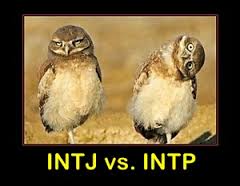 To be successful in these problem-solving careers, Myers-Briggs test INTJ types must learn to consider short-term goals and opportunities as well as their already over-arching, long-term goals. This can include immediate priorities, career choices that the INTJ values but may not consider rational, and present values that INTJ type may be neglecting in favor of their long-term vision. Creating immediate and long-reaching goals for yourself can help you level your thinking and focus more on the moment.
To be successful in these problem-solving careers, Myers-Briggs test INTJ types must learn to consider short-term goals and opportunities as well as their already over-arching, long-term goals. This can include immediate priorities, career choices that the INTJ values but may not consider rational, and present values that INTJ type may be neglecting in favor of their long-term vision. Creating immediate and long-reaching goals for yourself can help you level your thinking and focus more on the moment.
Furthermore, this MBTI personality type may have a hard time dealing with sudden life changes or events. By allowing yourself time to think about immediate goals and surprising situations without focusing solely on the long-term outcome, you can be ready for unforeseen circumstances that may come their way.
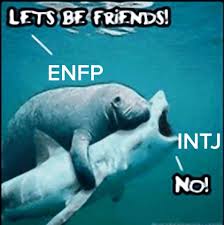 One of the most important strategies that the Myers Briggs Type Indicator test INTJ type can implement to be successful in the workplace is to open themselves up to new people, new experiences, and new ideas. If you find yourself closed off or antisocial in the work environment, slowly opening yourself to other networks and creating personal relationships with those around you can help you become a more well-rounded employee.
One of the most important strategies that the Myers Briggs Type Indicator test INTJ type can implement to be successful in the workplace is to open themselves up to new people, new experiences, and new ideas. If you find yourself closed off or antisocial in the work environment, slowly opening yourself to other networks and creating personal relationships with those around you can help you become a more well-rounded employee.
How accurate is this?
Actually, it makes me look like a bit of an asshole. Far from perfect. A bit of a get-er-dun prima-donna when, in fact, my biggest criticism over the years is that I’m too nice of a guy for my own good. Anyway, it was a good mental exercise which made me think for awhile, and I got a kick outa being matched with notable characters with the same personality. Factual ones were Rudy Giuliani, John F. Kennedy, and Hannibal— leader of the Carthaginians. Fictional characters were the protagonist and antagonist in Silence Of The Lambs, Clarise Starling and…. yeah — Hannibal Lector.
So I challenge you. You can have a FREE psychological analysis just like mine. Go ahead and take the Myers-Briggs Type Indicator® Test at:
-
Humanetrics — http://www.humanmetrics.com/cgi-win/jtypes2.asp
-
My Personality Test — http://www.my-personality-test.com/personality-type/?gclid=CM2N_4CetsgCFQhsfgodXiEGjw
-
Truity Type Finder — http://www.truity.com/test/type-finder-research-edition


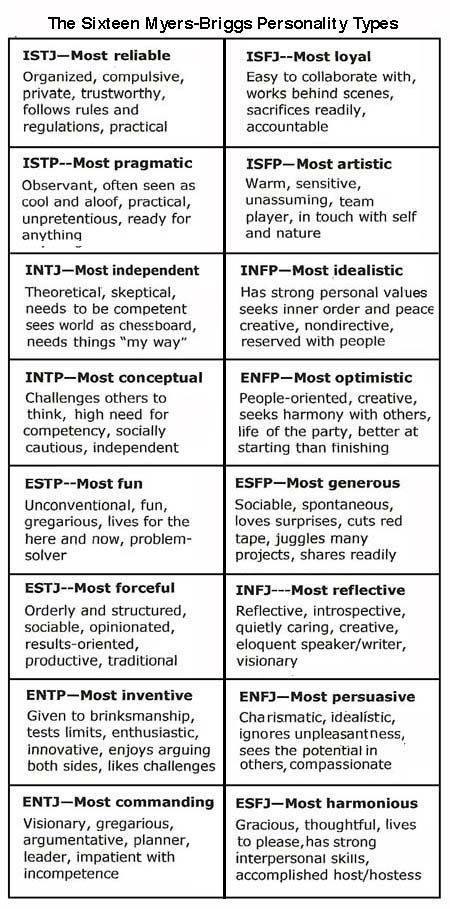
Hi! I just came across your site as I was doing some other research of my own on the various personality types. 🙂 I was intrigued when I saw the occupations you have retired from! In reading through this post, I was not surprised when you said you came up with INTJ! You approached it very much that way! 🙂
I noticed in the comments that things mentioned were that you write (sounded like it could be fiction?), and that you were curious about people’s personalities being the same throughout your life or not. 🙂 Interesting topics to me! I’m an INFJ. 🙂 People, ideas and patterns are what interest me, as well as creativity and writing!
From my own experience, observations and readings, what I have noticed is that if a person has experienced abuse of some kind, particularly in childhood, their personality can be appear and function differently than what it originally was, or what the person’s base is. I like calling it their natural type. It can also appear altered and function differently if the person has a personality disorder of some kind. It will be worse when a person has experienced both.
I know a number of people that have been abused, all in different abuse methods. As well as several people with personality disorders. All of these people displayed indecision in taking the test, and exhibited swings of back and forth between one side to the other in the various type functions, in varying degrees of stable to erratic. Because of this they would test one way when they didn’t actually fit that type. In some instances it was the type they wanted to be. In others, it was the type they were emulating but they were in a constant state of stress because they were acting outside of their natural type. Some would test their natural type, then test as another type the next time, then a third time would be the first type.
These people all had varying degrees of knowing who they are and feeling comfortable with who they are. The more the person knew who they were and were comfortable with who they were, the closer they tested to their natural type. The less they knew and were comfortable, the further away their type was. Those who were in the middle swung from one type to the other and back.
Just thought I would let you know what I have seen since this has come up in my various experiences and findings! 🙂
Thanks!
Thanks so much for you thoughtful insight, Sarah. This is a very interesting point about waving between types as well as reluctance to take the test. Thanks for commenting!
Hi Garry,
I’m a little late to the party – interesting article. I have taken several personality tests (mainly as part of a hiring process), I ALWAYS come up as an INFJ (this explains a lot huh LOL). I had wondered if personality types change over the course of the years, as people mature, and their experiences expand, but speaking solely for myself – I guess not. You are – who you are.
Cheers my friend (I’m the manatee [grin])
Hi Sandy! INFJ – The Advocate – That doesn’t surprise me 🙂 It’s really interesting how people are finding this test quite accurate.
I’ve taken these tests before and it always comes up the same, so maybe they have a point. INFP
Strengths
INFPs are imaginative, warm, idealistic, and compassionate. They are usually open-minded and accepting, unless someone is violating one of their values. Ultimately, INFPs want to change the world in whatever way they can. They want to make the world a better place for others.
INFP’s intuitive (N) quality gives them the ability to make inferences based on their “gut feeling”. They see problems as a big puzzle, and are excellent at overcoming challenges. They often read between the lines and seek out the deeper meaning of things.
INFPs primarily focus externally, and base judgments off of their intuitive feelings. When they do focus internally, they base their decisions off of their feelings and values.
Weaknesses
People who are INFPs are often described as free spirits. They may get wrapped up in their focus on the big picture, and forget about the details along the way. INFPs may have difficulty following through on projects. They do not like to focus on hard facts and logic, and may have trouble completing tasks that are very detail-oriented.
Because they rely so much on their intuition, INFPs must be careful not to read into everything too much. This may cause INFPs to misinterpret a friend’s emotions and over-dramatize things. Others may come to view INFPs as overly-sensitive or dramatic. To avoid this, INFPs must remind themselves that sometimes the most straight-forward answer is the best, intuition is not always needed.
INFPs’ ultimate goal is to help others, however, INFPs must be careful not to neglect their own needs in doing so. It is critical that INFPs do not sacrifice their own wellbeing and aspirations to help others. They can also be very hard on themselves if they believe they are not living up to their full potential. Once they accomplish something, INFPs are very humble and will rarely take credit for their accomplishments.
INFPs always aim to please others and will do anything to avoid conflict. Because they are such people-pleasers, INFPs often seek out the opinions of others, but may have a hard time accepting criticism. They may become reliant on others’ approval to validate their self-worth.
I suppose the good news is that, I’m the ‘right’ personality type to be a writer. 😀
Interesting stuff, Gary.
Annie
INFP – Another Mediator. Sounds like a writer personality 🙂 Thanks for stopping by Annie!
I’m INTJ, too 😀 Female INTJs are the rarest of all – I think only 2% of people.
I’m so glad I met another one, though a male – I found only a few of us during my lifetime.
I’m not sure if that’s a good thing or bad 🙂
Oh, it’s good, trust me. Imagine working with people who value that work the same way you do, who won’t bother you with stupid chat, but talk with you only if it’s important and means something, and in the same time, you can be sure that their part of the job will be done? Or, imagine having a friend who shares your level of social activities, and you don’t have to non-stop explain yourself? 😀
Only another INTJ can appreciate that 😉
Hi Gary. You can call me Ishmael or Mother Mary; I’m an INFP 🙂 The test is fun, but I haven’t found it to be accurate throughout all phases of life. There was a time when my work required dealing with the oldest and toughest Latino gang in existence. Wasn’t much feeling happening then, other than feeling for my gun in my purse. But I think even then feelings and perception eventually took over as I gained the respect of some nasty characters and gained their protection. I often question the “I” assessment. Most of the creatives I’ve come across like to work with music blasting away. I need silence. I do fit the profile of an introvert but wonder if it’s a hypersensitivity to sound. I’m very soft spoken in real life, and sleep is often difficult because of a low thrum that drives me nuts. Nobody else hears it, not in this house or by anyone who lives near here. It was so bothersome I finally got in the car at 2 a.m. (nicely clad in rumpled jammies), and went searching for the source. Found it. It was a very small power plant that runs when needed, and quite far from the house. I also question the coupling of feeling and perception. I’m always monitoring feeling as I perceive them and making adjustments to override the feelings. Doesn’t the “P” put the kebosh on the “F”? And am I not cracking a whip of reason and logic over intuition in this comment 🙂 It’s a fun test. Thanks for posting it and doing so with an open mind and curiosity. It’s quite interesting when approached in this way.
Hi Cyd! Or Ishmael/Mother Mary 🙂 Always great to read your comments. Gun in the purse? Hopefully it stayed in there 😉 So you’re a mediator? Nice personality to have. I’m wondering about your balancing the Feeling and Perceiving – are you a Libra, by chance?
That was spooky. Yes, I am a Libra 🙂
Called it!
Okay, here are my results, and they’re dead on. Amazing!
ENFJs are the benevolent ‘pedagogues’ of humanity. They have tremendous charisma by which many are drawn into their nurturant tutelage and/or grand schemes. Many ENFJs have tremendous power to manipulate others with their phenomenal interpersonal skills and unique salesmanship. But it’s usually not meant as manipulation — ENFJs generally believe in their dreams, and see themselves as helpers and enablers, which they usually are.
ENFJs are global learners. They see the big picture. The ENFJs focus is expansive. Some can juggle an amazing number of responsibilities or projects simultaneously. Many ENFJs have tremendous entrepreneurial ability.
ENFJs are, by definition, Js, with whom we associate organization and decisiveness. But they don’t resemble the SJs or even the NTJs in organization of the environment nor occasional recalcitrance. ENFJs are organized in the arena of interpersonal affairs. Their offices may or may not be cluttered, but their conclusions (reached through feelings) about people and motives are drawn much more quickly and are more resilient than those of their NFP counterparts.
ENFJs know and appreciate people. Like most NFs, (and Feelers in general), they are apt to neglect themselves and their own needs for the needs of others. They have thinner psychological boundaries than most, and are at risk for being hurt or even abused by less sensitive people. ENFJs often take on more of the burdens of others than they can bear.
Celebrities: Abraham Lincoln, William Cullen Bryant (poet), Sean Connery, and Oprah, to name a few.
Fictional characters: All the characters from Game of Thrones.
Interesting, Sue. The protagonist 🙂 You know, this might be a great tool for character development in our books. This tip is definately going into the Deadly Crime Characters guide.
Very cool idea! Plus, y’know, writers love ways to goof off, so there’s that. Case in point: look how many people participated already.
I might not be much of a writer but I’m really good at goofing off! Sounds like I’m in good company 😉
Absolutely doing this. Back atch with results. I don’t think you sounded like an asshole, Hannibal.
You only know my internet personality. You should come visit me in my cell sometime… and bring a nice Chablis 😉